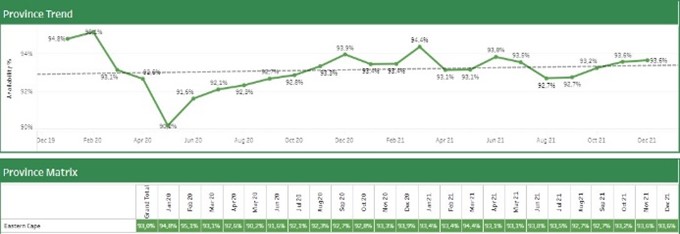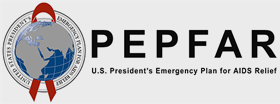
The year 2021 marked 40 years since the discovery of the human immunodeficiency virus (HIV). Nonceba, or “Ncesh” as she is affectionately called by her community, has lived with HIV almost as long as it has existed. She is at the heart of the AIDS pandemic both as a person living with HIV, and as a retired staff nurse who treated others in the public health care system.
South Africa remains at the center of the worldwide AIDS pandemic with an estimated 7.9 million people living with the disease. In addition, the country has the third-highest burden of tuberculosis (TB) internationally. An efficient and effective health supply chain that improves medicine availability is critical to addressing the disease burden.
The United States Agency for International Development (USAID)-funded Global Health Supply Chain Program – Technical Assistance (GHSC-TA) was launched in South Africa in September 2016. The program provides technical assistance to the South African government to strengthen public health systems and supply chains to advance an AIDS-free generation and contribute to the achievement of universal health coverage.
A resilient supply chain is key to ensuring that health establishments have adequate medicine stock on hand to meet patient needs and assist to achieve the 95-95-95 targets. When this is not the case, patients' health is jeopardized, and patients must return to the health establishment at their own expense and inconvenience to collect their medicines at a future date.
Addressing constraints and improving medicine availability is a core objective of South Africa’s National Department of Health (NDoH). GHSC-TA works with the NDoH and the provinces to design and implement innovative solutions to transform the South African public health supply chain.
Nonceba “Ncesh” knows firsthand how vital medication is in response to AIDS. “Nonceba” means mercy in her native Xhosa - its meaning reflects the resilience she has shown. As a retired field nurse with a career that spanned more than three decades, Ncesh was in the eye of the storm at the height of the AIDS pandemic, when critical medicines did not reach the average South African, and families in her local community in Mthatha, lost entire households to the disease.
Stigma impacted patients testing for the virus, and unnecessary lives were lost along the way. The NDoH has been at the helm of the response to the AIDS pandemic, with the mandate of ensuring that challenges and constraints are addressed and medicine is available to those, like Ncesh, who need it.
In addition to supporting NDoH, GHSC-TA works with the provinces to implement supply chain interventions and track medicine availability through the National Surveillance Center (NSC). This work helps to save lives and advance the USAID 95-95-95 goals, prioritizing access to life saving medicine for all. Over the last two years the Eastern Cape has achieved 90 percent availability of all necessary anti-retrovirals.

The GHSC-TA team in the Eastern Cape also supports the district assigned champion and district support partners to ensure that medicine availability data is up-to-date and available to inform decision-making and redistribute stock to prevent wastage.
As a result of years of continued support and capacity building, the provincial Departments of Health have improved medicine availability by leveraging technology to support monitoring and continuous improvement. This supports a reliable and efficient public health supply chain and access to safe, efficacious, good quality, and affordable medicines.
The information visualized on the dashboards of the NSC is used to monitor medicine supply on a routine basis. This data has been crucial to ensuring that sufficient supplies are available. The data is used for decision making, and collaboration takes place with facilities to identify stock problems at suppliers of these life-saving medicines, as well as at the provincial depots, hospitals and clinics, as well as at the service provider appointed to provide centralized chronic medication dispensing and distribution (CCMDD) services to the province.
Ncesh receives her treatment from the Mthatha Gateway Clinic in Eastern Cape and does not experience challenges with obtaining the medicine she needs. Her life expectancy has increased with the sustained availability of live saving medication - she recently celebrated her 70th birthday.


